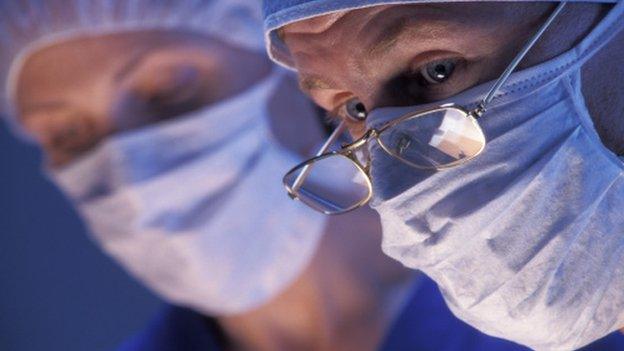NHS privatisation: Why the fuss?
- Published

The words privatisation and NHS together are enough to start a fight in an empty room. But what exactly do we mean by it? And why does the issue make many so angry?
London's Cromwell Hospital, run by Bupa, does a good trade in NHS patients at its gamma knife radiosurgery centre. About a third of the patients with brain tumours seen there are sent by the NHS, costing the health service nearly £7,300 a go.
But even the most ardent critics of privatisation in England (it tends to be a debate which is focused there) accept this.
Why? Because the NHS only has a handful of such units as it hasn't been considered economically viable to open more. So when demand requires the NHS pays for them to be seen privately.
Dr Louise Irvine, of the National Health Action Party, which was set up 2012 to campaign against privatisation, says: "It's is a good example of how the private sector can help. It's not financially worth it for the NHS to have lots of these facilities so paying for them is the best way.'
Emotions
So what is it that stirs the emotions then? It can be summed up in three words: profit, fragmentation and destabilisation.
Every year thousands of NHS patients are treated by the private sector for routine treatments, such as knee and hip operations. This is not because NHS hospitals cannot treat the patients, but because both the last Labour government and the coalition have encouraged private firms to get involved as a way to reduce waiting times and to offer patients choice.
Private firms have also been invited in to run whole services or entire centres - as in the case of Cambridgeshire's Hinchingbrooke Hospital until Circle pulled out recently.
Dr Irvine says: "The problem is that private companies cherry-pick what they want to do. They naturally do the easy stuff, leaving the NHS with the more complicated elements that are more expensive. That can cause real problems."

The privatisation debate in numbers

Last year the NHS in England spent £6.5bn on getting the private sector to see and treat patients.
That is the equivalent of 6.1% of the NHS budget.
Critics argue the bureaucracy to run a market system can add billions more to that bill.
As a proportion of the NHS budget that is up from 2.8% in 2006-7.
Another £3bn was spent last year on getting other providers, including local authorities and charities, to deliver NHS care.
Another £7.5bn was spent on GP services.
The average earnings of GP partners is £102,000 - a figure that has been falling in real terms in recent years.
The average pay for GPs who are employed by partners is £56,400.

She cites another Bupa contract - one to run musculoskeletal services in Sussex which was cancelled amid concerns about its effect on the local hospital's finances - as an example of this.
Charities
But, by that token, you could argue that the charities that run hospice, drug and alcohol treatment or cancer services could fall into that category. After all, they tend to be run by the profit-making arms of their organisations, but have a long history of working side-by-side NHS providers.
Dr Irvine accepts the point, saying with some services changing hands all the time this too can lead to destabilisation and fragmentation of care. But she also says some services, such as the hospice sector, have played an invaluable role in helping the NHS improve care.
And what about GPs? They have what is effectively self-employed status. Partners who own the practices take profit from the business once overheads and the salaries of staff, including more junior GPs on the payroll, are deducted.

These GP businesses can be pretty big. Once of the most successful in recent years has been the Hurley Group in London. It runs 13 GP practices and employs more than 200 staff. One of the partners is Dr Clare Gerada, a former president of the Royal College of GPs and an outspoken critic of this government's approach to the NHS.
She is adamant GPs are not private though. "We are essentially the state, but with different contractual arrangements. The state decides where I can open, what I can do. In practice a GP is virtually completely reliant on the NHS for income."
She says when considering privatisation of the NHS, it is important to look at the wider context.
"What makes the NHS unique is not that it is free at the point of need - many other health systems are - but that it is planned on the basis of need.
"We have to have unprofitable services as well as those that can make people money. Once you get other providers involved it is about who can shout the loudest for their service. Once that planning goes and the risk is other areas of healthcare lose out."
But even if you accept that GPs are in the NHS, what about dentists, opticians and pharmacists? All are partly paid for by the NHS and partly by individual user contributions - and as a result are delivered by individuals and organisations that sit outside the traditional health service family.
"It is really quite a difficult one to define - and the arguments don't always run along a consistent line," says Richard Murray, director of policy at the King's Fund. "For some it is about profit, for others it's about what control the state has. You can go on and on."